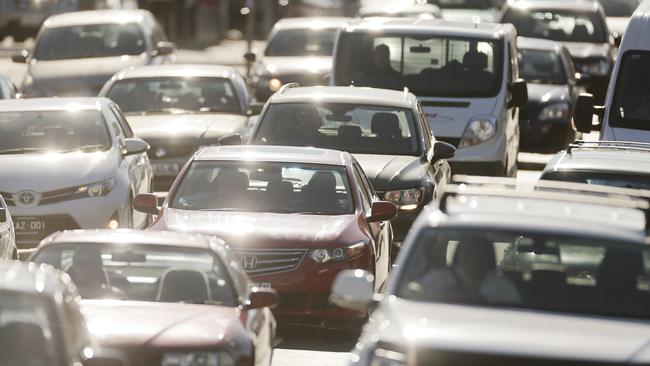Hobart City Council committee makes call on report recommending traffic changes
Hobart City Council’s infrastructure committee has voted on a report recommending several changes to speed limits.

Tasmania
Don't miss out on the headlines from Tasmania. Followed categories will be added to My News.
REDUCED speed zones on Hobart streets could soon be implemented after a council committee voted in favour of the proposed traffic changes.
The Hobart City Council’s infrastructure committee on Wednesday night voted 4-1 in favour of a report recommending several changes to speed limits.
The report aims to provide a safer environment for traders, pedestrians and cyclists by making three CBD “spines” of 30km/h zones surrounded by a 40km/h zone.
MORE: HOBART CITY COUNCIL TO CONSIDER SPEED LIMIT CHANGES
Proposed changes include:
Elizabeth St between Melville and Morrison streets — 50km/h to 30km/h;
Collins and Liverpool streetsbetween Murray and Argyle streets — 50km/h to 30km/h; Melville and Bathurst streets between Harrington and Campbell streets — 50km/h to 40km/h; Harrington, Murray, Argyle and Campbell streets between Melville and Davey streets — 50km/h to 40km/h;
Liverpool and Collins streets between Harrington and Murray streets, and between Argyle and Campbell streets — 50km/h to 40km/h;
Market Place, Kemp St, Trafalgar Place, Purdys Mart, Wellington Court, Harrington Lane, Watchorn St, Victoria St, Bidencopes Lane — 50km/h to 40km/h.
Other proposed changes include speed reductions for retail precincts between 7am and 7pm Monday to Thursday and 7am until 10pm Friday to Sunday.
This would see reductions to 40km/h in North Hobart between Burnett and Tasma streets, Lenah Valley between Giblin St and Greenway Ave, South Hobart, from Excell Lane and the Southern Outlet Junction, plus various sections of Sandy Bay and New Town.
Providing a deputation at the committee hearing, Heart Foundation chief executive Graeame Lynch said speed reductions to 30km/hr had become common in mainland capitals.
“It’s the sort of speed where motorists can share streets comfortably with pedestrians and cyclists, and the anecdotal evidence suggests people share the roads quite comfortably,” he said.
“Where speed limits are reduced to 30km/h, people feel safer to walk in those locations and pedestrian traffic increases. Businesses also tend to thrive, so there’s a good economic case for walking and cycling.”
It is believed a speed reduction from 50km/h to 40km/hr would add 18 seconds of travel time across a 1km journey.
Alderman Simon Behrakis voted against the item, having also moved an unsuccessful motion to defer the item until after the completion of a traffic impact analysis.
He said reducing city speed limits would “serve to further throttle a struggling CBD that is only now trying to rebuild after the significant impact of the COVID-19 downturn”.
A Mercury poll showed 76 per cent of 336 voters did not support a CBD speed reduction.
The full council will vote on the matter on July 6.


